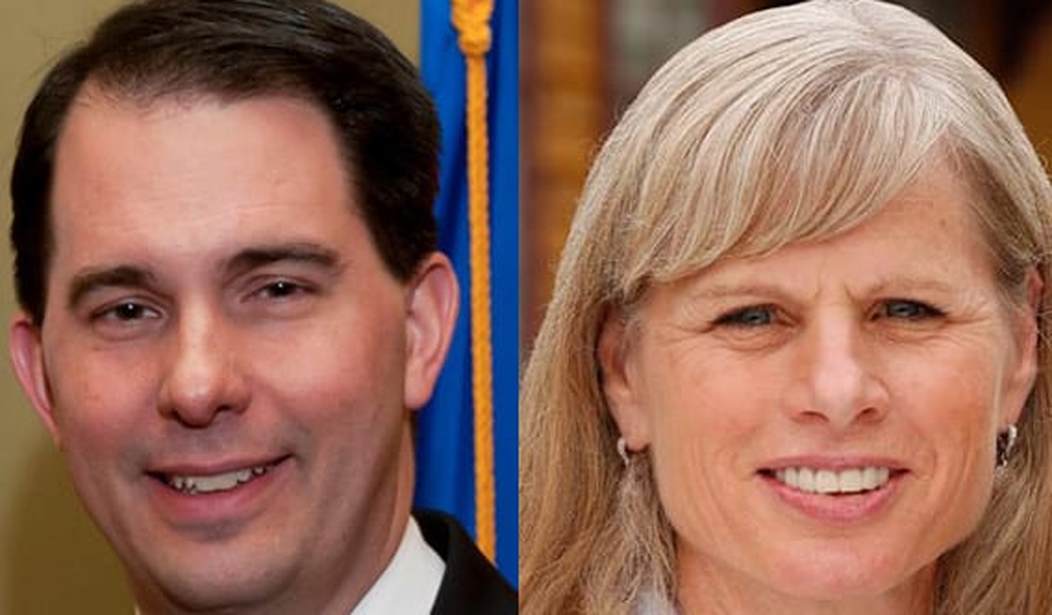Wisconsin Republican Governor Scott Walker, who survived a 2012 recall effort by groups angered over his successful push to end withholding of dues paid by state employees to their unions, is set to square off against Democratic challenger Mary Burke for Election Day honors this November.
And recent polling shows that the recall victor could face a tough fight to keep his job this time around.
Burke, the Democratic Party of Wisconsin’s nominee for governor, is a current school board member in Madison. She’s also a former top executive at Wisconsin’s Trek Bicycle Corporation, a company founded by her father in the 1970s that has since become the country’s largest bike maker.
Walker, former Milwaukee County executive, the county’s top leader, is clearly a man with presidential aspirations. He first came to national attention in 2010 after riding a wave of voter dissatisfaction that saw Wisconsin Republicans take control of the state legislature until a summer 2012 recall election loss tossed control of the upper house, the Senate, back to Democrats.
Walker’s Republicans stormed back, though, cementing their grip on state government in November 2012 by keeping the legislature’s lower house and recapturing its upper. The Wisconsin Democracy Campaign says more than $81 million was spent by all sides during that recall.
The Milwaukee Journal Sentinel in a recent editorial also projected high spending by Walker and Burke as well as groups sympathetic to their respective campaigns — most of it “just to air noisy television ads,” the paper observed.
Democratic challenger Burke should present a stiff challenge to Walker. She served as the Badger State’s commerce secretary from 2005 to 2007, a position she was appointed to by Jim Doyle, Walker’s Democratic predecessor.
In an Oct. 7, 2013, campaign video, the Democrat also claims success during her commerce tenure.
“All in all it meant 84,000 more Wisconsin jobs than we have today,” Burke said.
In selecting Burke to carry the fight to Walker, Wisconsin’s Democratic leaders hope the challenger’s business credentials will appeal to centrist voters in both parties as well as an increasingly growing number of independents claiming allegiance to neither major political party.
Burke herself is described by friends and associates as a tireless worker and she spent time in the early 1990s as a consultant in New York and Washington, D.C. Prior to her employment she gained a finance undergraduate degree from Georgetown University and a master’s degree in business administration from Harvard Business School in 1985. Burke is also well-regarded by many for her philanthropic and charitable efforts.
Scott Walker is a relative rarity in high-level state and federal politics, being one of the few leaders of national importance not possessing at least a four-year college degree. He left Wisconsin’s Marquette University in his senior year without finishing studies, though he recently announced an intention to complete his alma mater’s graduation requirements as soon as possible.
Walker deciding to complete his college studies at the age of 46 — he’ll be 47 this coming November — perhaps provides a clue that his eyes are fixed on the ultimate prize, the White House, should he triumph over Burke.
The last U.S. president without a college degree was Harry S. Truman, who left office in 1953, and Walker may believe that gaining a degree would silence criticism from national Democrats who say that he’s unqualified for a run for the presidency despite his tenure as Wisconsin governor.
Polling of the battle between Walker and Burke hasn’t yet fully spooled up and what results are available shows a generally competitive race between the two combatants.
A Marquette University poll this week put Walker ahead by 3 points. An April 14-15 poll of likely voters by Magellan Strategies, a Republican-leaning polling firm, showed a tie between Walker and Burke. In early March, Rasmussen Reports, a national polling organization considered sympathetic to Republicans, released its own survey, with another Walker-Burke dead heat the result.
Walker outperformed his 2014 opponent in a Democrat-leaning polling firm’s survey of Wisconsin registered voters conducted April 17-20. Public Policy Polling gave the Republican a 3-point lead over Democrat Burke, though the margin of error in that poll was an equally tight +/- 2.9 percent.
Walker did enjoy slightly more breathing room against Burke in a late-March nonpartisan Marquette University poll of registered voters, with the governor holding a 48 percent to 41 percent edge over his challenger.
The Real Clear Politics April 14 to May 18 average of polls on the Wisconsin governor’s race gives Walker a 2-point advantage over Burke, making the race a toss-up.
Walker’s lead over Burke was padded somewhat by a March 23 to April 3 survey of likely voters conducted by Wisconsin Public Radio and St. Norbert College, a small private university located in De Pere, Wis.
The WPR/St. Norbert poll gave Walker a 16-point lead over Burke. WPR/St. Norbert’s polling effort is considered by various Badger State pundits and polling experts to be an outlier, however. Pull that particular survey from the mix and a much tighter advantage for Walker results, one well within most polls’ statistical margin of error.
In seeking to define the Democratic challenger before she does gain wide in-state recognition, something she lacks at present, the Walker campaign as well as the Republican National Committee have attempted to paint Burke in less-than-glowing terms.
“Mary Burke’s a weak candidate who has failed to gain traction. She’s waffled on the issues, refuses to tell voters where she stands. She also has problems with her own base. Add those together and it’s not a recipe for success against a strong candidate like Walker,” says RNC spokesman Raffi Williams.
Calls and emails to the Democratic Party of Wisconsin for a response to the RNC’s observations about Burke were not returned.
“Wisconsin voters face a clear choice in this election between two very different approaches,” Burke campaign spokesman Joe Zepecki told the Wisconsin State Journal after the latest poll by Marquette showed her gaining ground. “It is clear that voters recognize that Walker’s top down, trickle down approach that puts big corporations and special interests ahead of hard-working Wisconsinites isn’t working.”
Burke and her campaign have consistently fired back against Walker, including in a February 2014 Journal Sentinel article in which the Democrat called him a “career politician” willing to say anything to shift focus off the actual issues affecting the state.
Discounting a single outlier poll, the Walker-Burke gubernatorial contest is tight and promises to be hard-fought throughout the election season. Should Walker win big over Burke, talk of a 2016 presidential or vice-presidential run is sure to increase as well.
Should Burke successfully wrest the governor’s office from him this coming November, that could be a death blow to Walker’s presidential aspirations. And with national Republicans casting about for a 2016 presidential nominee to go up against presumptive Democrat nominee Hillary Clinton, a Walker defeat — or even a very tight win — might have repercussions far beyond the Badger State’s borders.








Join the conversation as a VIP Member